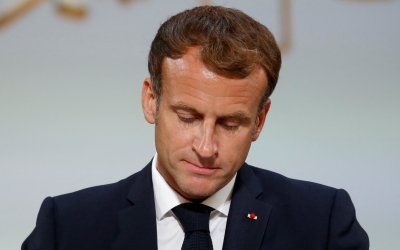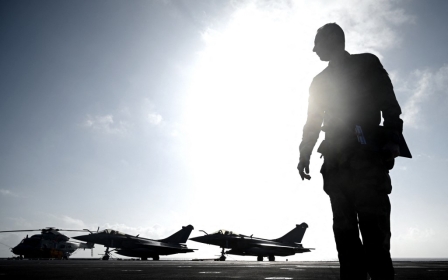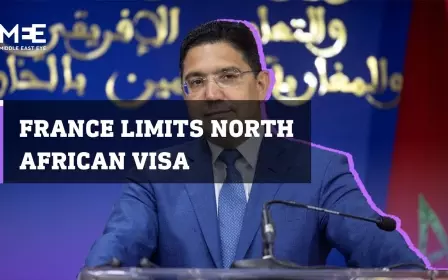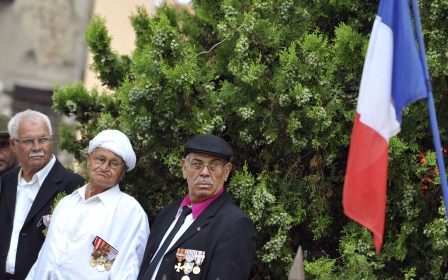France's Macron calls 1961 massacre of Algerians an 'unforgivable crime'
Emmanuel Macron has condemned as "inexcusable" a deadly crackdown by Paris police on a 1961 protest by Algerians whose scale was covered up for decades, the strongest recognition by a French president of a massacre in which many bodies were thrown into the River Seine.
On Saturday, on the eve of the 60th anniversary of the bloodshed, Macron told relatives of victims that "crimes" were committed on the night of 17 October 1961 under the command of the notorious Paris police chief Maurice Papon.
'The crimes committed on the night of October 17, 1961, under the authority of Maurice Papon, are inexcusable for the Republic'
- French President Emmanuel Macron
He acknowledged that several dozen protesters had been killed, "their bodies thrown into the River Seine" and paid tribute to their memory.
The precise number of victims has never been made clear and some activists fear several hundred could have been killed.
Macron, the first French president to attend a memorial ceremony for those killed, observed a minute of silence in their memory at the Bezons bridge over the Seine on the outskirts of Paris where the protest started.
New MEE newsletter: Jerusalem Dispatch
Sign up to get the latest insights and analysis on Israel-Palestine, alongside Turkey Unpacked and other MEE newsletters
His comments that crimes were committed went further than predecessor Francois Hollande, who acknowledged in 2012 that the protesting Algerians had been "killed during a bloody repression".
Macron posted a video clip on Twitter following the ceremony, showing him standing with mourners on the banks of the Seine.
“France looks at its entire history with lucidity and recognises the clearly established responsibilities. The crimes committed on the night of October 17, 1961, under the authority of Maurice Papon, are inexcusable for the republic. To the victims, today we pay tribute,” the accompanied caption read.
The Elysee said that Macron "recognised the facts: that the crimes committed that night under Maurice Papon are inexcusable for the Republic”.
"This tragedy was long hushed-up, denied or concealed,” it said in a statement.
Taking responsibility
The 1961 rally was called in the final year of France's increasingly violent attempt to retain Algeria as a north African colony, and in the middle of a bombing campaign targeting mainland France by pro-independence militants.
More than 30,000 Algerians had gathered to protest in Paris a decision to impose a curfew solely on the country's French Algerian minority.
Some were shot dead. Others had their bodies thrown into the River Seine.
The pro-independence National Liberation Front (FLN) had called on Algerian migrants from the capital's working-class western suburbs to rally at a landmark square in Paris.
Other demonstrations were planned elsewhere in the city, and 10,000 policemen and gendarmes were deployed.
Papon was in the 1980s revealed to have been a collaborator with the occupying Nazis in the Second World War and complicit in the deportation of Jews. He was convicted of crimes against humanity but later released.
A report commissioned by the president from historian Benjamin Stora earlier this year urged a truth commission over the Algerian war, but Macron ruled out issuing any official apology.
On Saturday, Algerian President Abdelmadjidn Tebboune announced that a minute of silence would be held the following day and each 17 October to commemorate the "martyrs" of the 1961 events.
In a statement, Tebboune said the crackdown revealed the horror of "massacres and crimes against humanity that will remain engraved in the collective memory”.
There was "strong concern for treating issues of history and memory without complacency or compromising principles, and with a sharp sense of responsibility", free from "the dominance of arrogant colonialist thought,” he added.
Macron is France's first leader born after the colonial era, and has made a priority of historical reconciliation and forging a modern relationship with former colonies.
Historian Emmanuel Blanchard told AFP that Macron's comments represented "progress" and had gone "much further" than those made by Hollande in 2012.
But he took issue with the decision to pin responsibility on Papon alone, saying that then prime minister Michel Debre and President Charles de Gaulle had not been held to account over the ensuing cover-up or the fact Papon would remain Paris police chief until 1967.
Middle East Eye delivers independent and unrivalled coverage and analysis of the Middle East, North Africa and beyond. To learn more about republishing this content and the associated fees, please fill out this form. More about MEE can be found here.





